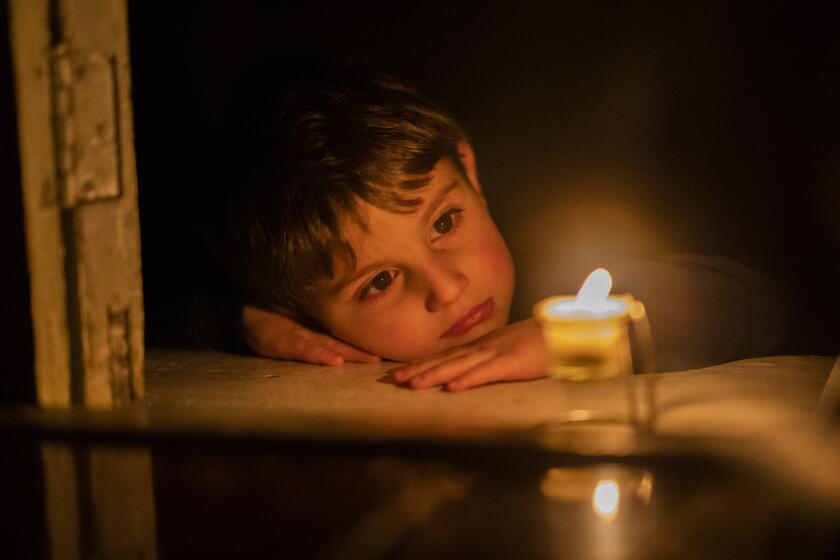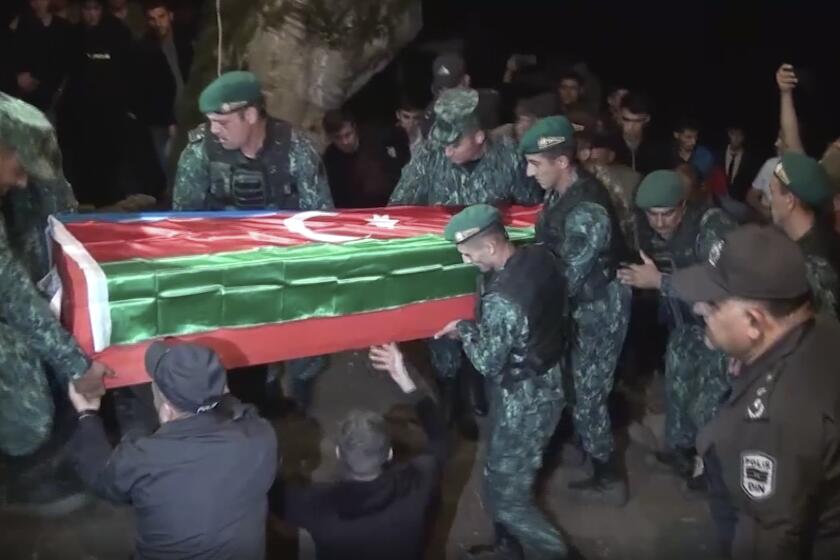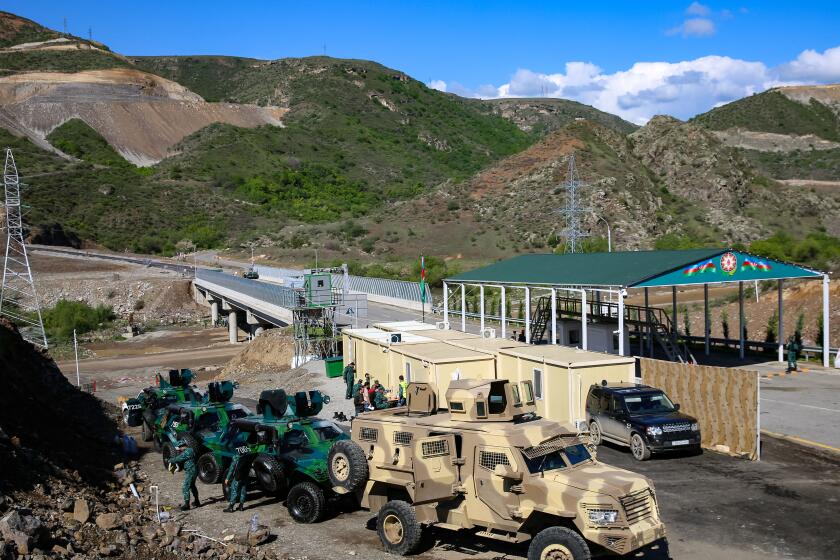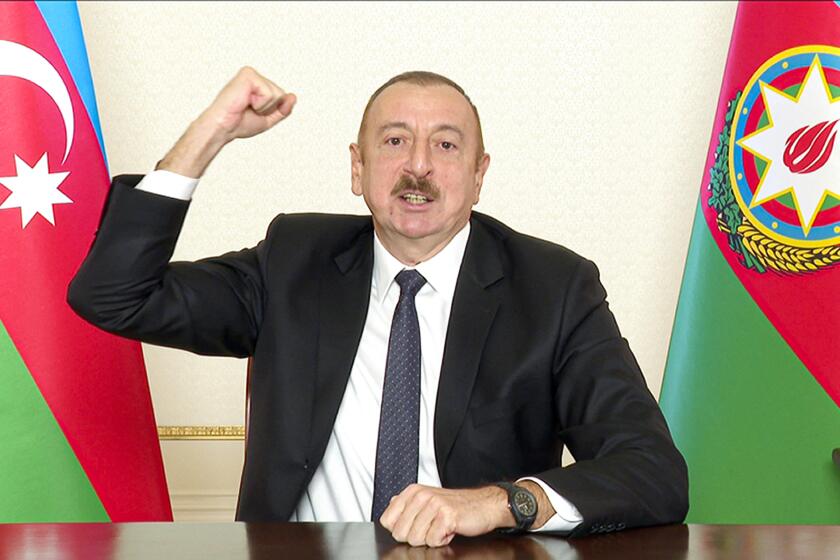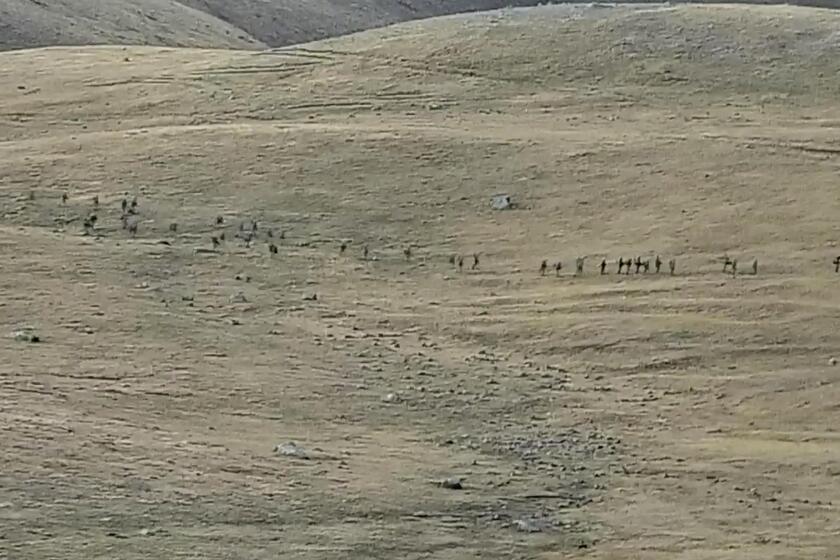Fighting flares again in a breakaway region in the Caucasus Mountains
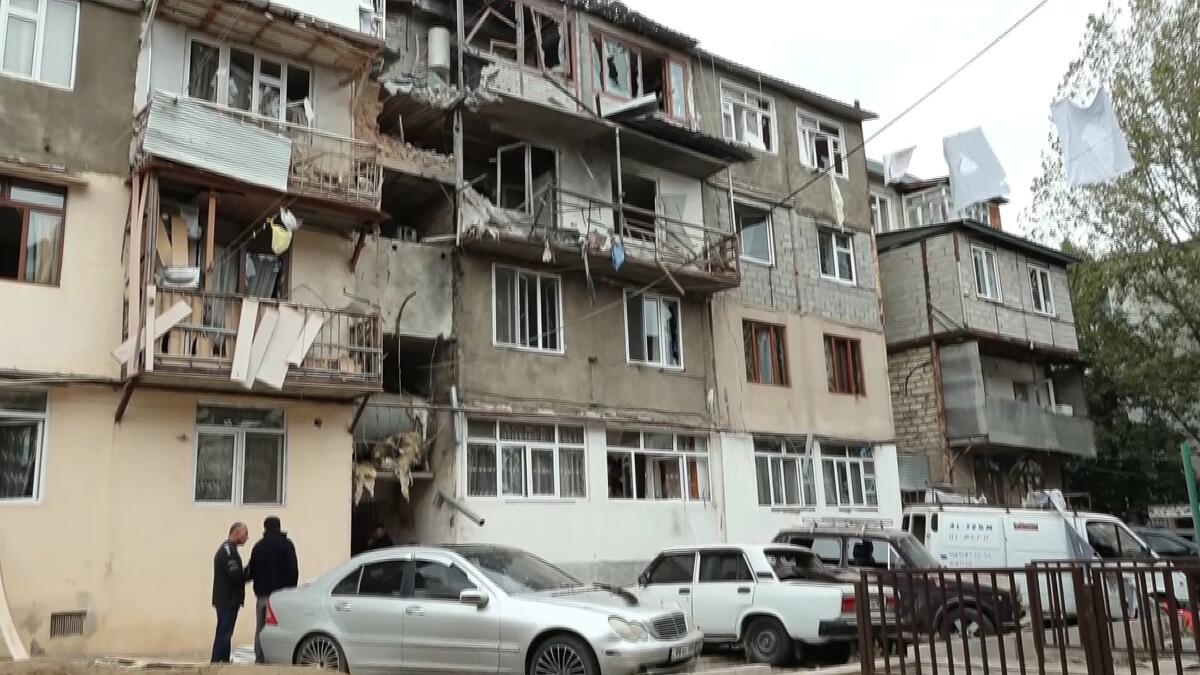
- Share via
YEREVAN, Armenia — Azerbaijan’s forces rained artillery fire on Armenian positions in Nagorno-Karabakh on Tuesday, and local officials reported that scores of people — both civilians and troops — were killed and wounded in the fighting.
Ethnic Armenian authorities in the Caucasus Mountains region urged Azerbaijan to sit down for talks, but Azerbaijan’s presidential administration said what it described as an “anti-terrorist operation” will continue until “illegal Armenian military formations” surrender and the separatist government of Nagorno-Karabakh dismantles itself.
The reports raised concerns that a full-scale war in the region could resume between Azerbaijan and Armenia, which have faced off for more than three decades in a conflict over the mountainous territory. The most recent heavy fighting there lasted six weeks in 2020.
Azerbaijan’s Defense Ministry announced the start of the operation hours after it reported that four soldiers and two civilians died in land mine explosions in Nagorno-Karabakh, also known as Artsakh.
Tensions between Armenia and Azerbaijan are high again two years after they ended a war over Nagorno-Karabakh that killed about 6,800 soldiers.
The ministry did not immediately give details but said that front-line positions and military assets of Armenia’s armed forces were being “incapacitated using high-precision weapons,” and that only legitimate military targets were attacked.
Armenia’s Foreign Ministry, however, denied its weapons or troops were in Nagorno-Karabakh and called reported sabotage and land mines in the region “a lie.” Armenian Prime Minister Nikol Pashinyan alleged that Azerbaijan’s main goal is to draw his country into hostilities.
Ethnic Armenian officials in Nagorno-Karabakh said in a statement that the regional capital, Stepanakert, and other villages were “under intense shelling.” The region’s military said Azerbaijan was using aircraft, artillery and missile systems and drones.
Video from the city showed a damaged residential building with shattered windows and damaged cars nearby. Residents of Stepanakert moved to basements and bomb shelters, and the fighting cut off electricity. Food shortages persisted in the area, with the limited amount of humanitarian aid delivered Monday not distributed due to the shelling, which resumed in the evening after halting briefly in the afternoon.
The disputed Nagorno-Karabakh region pits the two former Soviet republics as alliances with Russia and the West shift.
Nagorno-Karabakh human rights ombudsman Geghan Stepanyan said 25 people, including two civilians, were killed and 138 others, including 29 civilians with 11 children among them, were wounded. According to Stepanyan’s earlier statements, one child was among those killed.
The Azerbaijani Prosecutor General’s Office said Armenian forces fired large-caliber weapons at Shusha, a city in Nagorno-Karabakh under Azerbaijan’s control, killing one civilian.
Neither claim could be independently verified.
Although Azerbaijan said the operation was limited to military targets, the Defense Ministry said “humanitarian corridors” had been created to evacuate the population.
Thomas de Waal, a senior fellow at the Carnegie Europe think tank, said the military operation could be part of a plan by Azerbaijani President Ilham Aliyev to get ethnic Armenians to leave the area.
U.S.-hosted talks bring together foreign ministers of bitter rivals Armenia and Azerbaijan. “Tangible progress” is reported, but no conclusions.
Although he said it was still early to assess, it could be “a kind of limited military action which will try to coerce thousands of Armenians to flee to Armenia. And then Aliyev can achieve his objective of taking over Karabakh with not so much bloodshed,” De Waal told the Associated Press.
Earlier Tuesday, Azerbaijan said six people were killed in two separate explosions in the region that is partly under the control of ethnic Armenian forces.
A statement from Azerbaijan’s Interior Ministry, state security service and prosecutor-general said that two highway department workers died before dawn when their vehicle was blown up by a mine and that a truckload of soldiers responding to the incident hit another mine, killing four.
Nagorno-Karabakh and sizable surrounding territories had been under ethnic Armenian control since the 1994 end of a separatist war, but Azerbaijan regained the territories and parts of Nagorno-Karabakh during the 2020 fighting. That ended with an armistice placing Russian peacekeepers in Nagorno-Karabakh.
However, Azerbaijan alleges that Armenia has smuggled in weapons since then. The claims led to a blockade of the road connecting Nagorno-Karabakh to Armenia, causing food and medicine shortages.
As tensions escalate again between Armenia and Azerbaijan, U.S. Secretary of State Antony J. Blinken voices support for Armenia.
Red Cross shipments of flour and medical supplies reached Nagorno-Karabakh on Monday, but local officials said roads to the region were not fully open.
The hostilities come amid high tensions between Armenia and its longtime ally Russia. Armenia has complained repeatedly that the 2,000-member Russian peacekeeping force was unable or unwilling to keep the road to Armenia open, even though that duty was stipulated in the agreement that ended the 2020 war.
Armenia also angered Russia, which has a military base in the country, by holding military exercises with the U.S. this month and by moving toward ratifying the Rome Convention that created the International Criminal Court, which has indicted Russian President Vladimir Putin.
Russian Foreign Ministry spokeswoman Maria Zakharova denied Tuesday that Russia was told in advance of Azerbaijan’s intention to mount the operation, saying the peacekeepers were notified only “a few minutes” before it began.
Kremlin spokesman Dmitry Peskov said Moscow was “concerned by a drastic escalation of tensions and the beginning of hostilities” in the region, and that the Russian military was in touch with its Armenian and Azerbaijani counterparts, trying “to bring back the process of settling [the conflict] back onto political-diplomatic track.”
U.S. Secretary of State Antony J. Blinken said “the use of force to resolve disputes is unacceptable and runs counter to efforts to create conditions for a just and dignified peace in the region.” German Chancellor Olaf Scholz said the Azerbaijani government “must immediately stop the attacks and return to diplomacy.”
The truce announcement followed two days of heavy fighting, the largest outbreak of hostilities between the two longtime foes in nearly two years.
Turkish President Recep Tayyip Erdogan, whose country supports Azerbaijan, condemned “the latest negative developments.”
De Waal said that the Russian peacekeeping force “has lost probably its best officers to the war in Ukraine,” but that ”this breakdown in Armenia-Russian relations is a factor here.”
“I think it encourages Azerbaijan to be bolder and it makes the Russians more ambiguous and less willing to intervene. And, you know, it’s quite possible, indeed, that the Russians want to use a crisis to instigate regime change in Armenia,” he said.
Thousands of protesters gathered Tuesday in central Yerevan, the capital of Armenia, blocking streets and demanding that authorities defend Armenians in Nagorno-Karabakh. Some clashed with police, who reportedly used stun grenades. Others rallied at the Russian Embassy, demanding action. The Russian state news agency Tass reported, citing an unidentified source in the diplomatic mission, that the building was blocked by protesters.
Pashinyan said that “attempts to draw Armenia into the military escalation are unacceptable” and that Russian peacekeepers should act, along with the United Nations Security Council.
Associated Press writers Jim Heintz, Dasha Litvinova, Aida Sultanova and Siranush Sargsyan contributed to this report.
More to Read
Sign up for Essential California
The most important California stories and recommendations in your inbox every morning.
You may occasionally receive promotional content from the Los Angeles Times.
